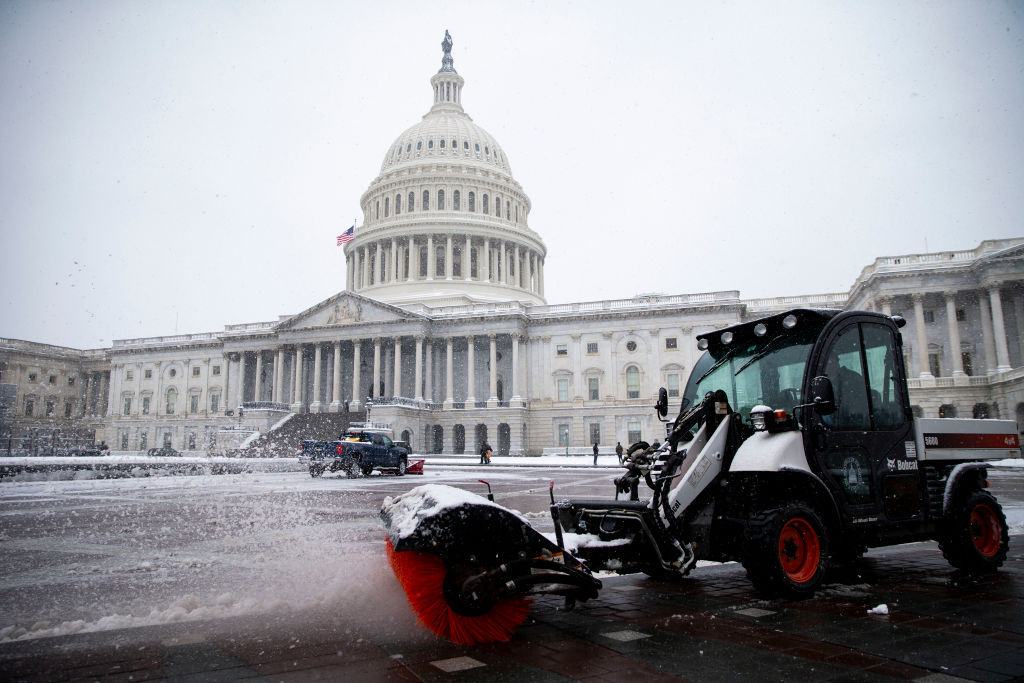Washington is supposed to be recession-proof: when times are bad, the government just hires more. But the city isn’t shutdown-proof. There are more than 360,000 federal employees in the DC area, and many are among the 800,000 across America who last week received a salary bank transfer that said zero dollars and zero cents.
A number of foodbanks have opened here, offering free meals to anyone with federal identification. Whole Foods, the upmarket supermarket, has gone a step further. It is serving spaghetti dinners to anyone who is hungry. Not everyone I met at this ‘community gathering’ was a federal worker, though they all communed in a spirit of anti-presidential solidarity. I saw a large woman helping herself to a big plate of free food, and asked if she were a federal employee. ‘No,’ she replied crossly. ‘What about you — journalist?’ I then saw a young man, Rob, tucking into the garlic bread. Did he work for the government? ‘No, but my partner does,’ he answered. ‘This is more about everyone coming together to support each other through the shutdown. It’s kind of sweet if you think about it.’
In the canteen, I found three fully furloughed federal employees, Adam, Anne and Christina, munching on the free grub. ‘Donald Trump can give people McDonald’s in the White House,’ said Christina. ‘Why can’t we eat free pasta at Whole Foods?’
It snowed in Washington over the weekend. Late on Sunday, the government’s Office for Personnel Management announced that federal offices would be closed due to the weather. But by then nobody much cared: politics had already shut the city down.
The so-called ‘Trump Shutdown’ — the longest government shutdown in US history — now feels a bit like the big Brexit problem in Britain.
It is a political impasse that sours the public mood. Everyone says that the politicians are awful, that America needs better leadership, that the whole damn system is broken. Nothing gets better.
The locals blame President Donald Trump for putting his border wall fetish above the interests of the American people. But even in this intensely Democratic metropolis, the common sentiment is that both major political parties have failed, because they can’t agree to pass federal appropriations. The Republicans and Democrats are both as bad as each other. The government isn’t working because politics isn’t working. And why are the congressmen responsible for this mess still being paid?
The bars in DC are empty, though one barman said that’s more to do with January abstinence than money worries. The gyms are still heaving as everyone starts their year with healthy intentions. Federal employees suddenly have more free time than usual.
I met some queueing outside an ‘Orange-theory’ Fitness studio — membership is over $200 a month. One had been furloughed — Americans so enjoy saying that word — for 10 days. ‘Sure, it is really scary,’ she said, not sounding really scared. ‘But what can you do?’ ‘It’s kind of weird,’ said another, who worked for a federal agency not far away in Virginia. ‘Our office literally runs out of money on Friday. We don’t have any idea what goes on after that.’
Again, similar to Brexit, the major anxiety stems from uncertainty: nobody knows what might happen if the political deadlock cannot be broken. Trump and the Democrats can’t reach a compromise over funding border security. The Democrats think they are winning the fight in the court of public opinion — and polls suggest they are right. But Trump, ever the high-stakes poker player, is far too stubborn to fold. Unless he calls a national emergency and seizes state funds, it’s hard to see how the fight ends.
The public is becoming increasingly angry, but it’s also clear that the shutdown isn’t quite as terrible as lots of desperate-for-drama journalists make out — not yet, at least. The juggernaut federal government will simply not grind to a halt. The military is still being paid, as are Defense Department officials, though the Coast Guard is not. A huge number of federal employees are considered ‘essential’ or ‘excepted’ and are working through the shutdown. Essential employees aren’t being paid, however, and the longer that goes on, the more grave the crisis will become.
The architecture of American government means that state and city agencies are performing the most essential administrative chores. This Saturday, as soon as the snow began to fall, trucks began salting and gritting the roads with remarkable efficiency. The taps still run. Homes are still being heated. Bins are still collected (except in national parks, where bears are now apparently feasting on rubbish that federal employees haven’t picked up).
For free-market conservatives, the shutdown merely provides further evidence of how horrifically bloated federal government has become. If so many workers are not ‘essential’ to government function, they say, why do Americans need them at all? The joke among this crowd is that the shutdown will be resolved before January 28, when the Inland Revenue Service starts processing tax returns.
It’s worth remembering that Trump fans wanted him to ‘drain the swamp’ — that is, the vast swollen bureaucracy of Washington, DC. Now, some of his more radical cheerleaders in the media are urging him to use the opportunity of the shutdown to cut out non-essential government spending forever. The deep state — that enemy of Trumpism — could be reduced in size, they say.
But the people most likely to be affected by government freezes are working-class voters, many of whom supported Trump. When a Transport Security Administration official in New York was asked if he was being paid, he replied, ‘No, and I voted for him, the bozo.’ By refusing to budge on the shutdown, Trump is distressing those much-discussed fed-up voters who put their trust in him back in 2016. As Crystal Minton, a prison worker in Florida, put it, ‘He’s not hurting the right people.’
It’s easy to be glib about the shutdown if you aren’t afraid your income will vanish. For hundreds of thousands of American federal employees living paycheck to paycheck, it’s frightening. In places like Washington, the knock-on effect on the private sector is huge, too. On Tuesday, I met 53-year-old Rob Briskman, a charismatic Uber driver. He told me that his taxi income had halved as a result of the shutdown. ‘I don’t work for the government,’ he said. ‘I drive the government to work. And people in the media aren’t focusing on the domino effect on people like me.’
His father, he added proudly, was Rob Briskman Snr, a major pioneer in satellite radio. ‘Look him up on Wikipedia,’ he said. ‘But even with my wealthy family, I am not going to ask them for money. I just want to keep smiling, listen to good music, and keep plugging away.’
This article was originally published in The Spectator magazine.


















